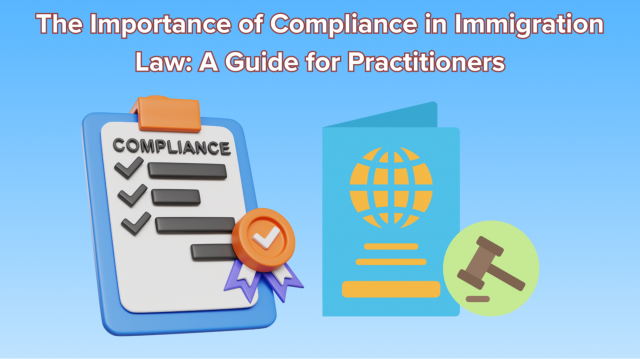As an immigration practitioner, navigating the intricate web of laws and regulations can be daunting, but maintaining strict compliance is paramount to safeguarding the interests of your clients and protecting the integrity of your practice.
Failure to comply can have severe consequences, including denial of applications, hefty fines, and even criminal charges. This guide will equip you with the knowledge and strategies necessary to navigate the complexities of immigration compliance, ensuring that you stay ahead of the curve and uphold the highest professional standards.
The Consequences of Non-Compliance
Non-compliance with immigration laws and regulations can lead to severe legal consequences. Depending on the nature and severity of the violation, penalties may include denial or revocation of visas, deportation, and even criminal charges. These consequences can have a profound impact on your clients' lives, potentially separating families, disrupting careers, and jeopardizing future immigration opportunities.
As an immigration practitioner, your reputation is paramount. Non-compliance can tarnish your professional standing and credibility, making it challenging to attract and retain clients. Additionally, a history of non-compliance may lead to increased scrutiny from immigration authorities, potentially hindering your ability to effectively represent your clients.
Implementing Robust Compliance Procedures
Establishing clear policies and protocols for your practice is essential for maintaining compliance. These should cover various aspects of your work, including client intake, immigration case management, document preparation, and communication with immigration authorities.
Utilizing immigration software for practitioners can greatly enhance these processes by automating routine tasks, ensuring accuracy, and facilitating better tracking of cases. By documenting and standardizing your processes, you can minimize the risk of errors and ensure consistent adherence to legal requirements.
Creating a culture of compliance within your practice is paramount. This involves not only implementing robust policies and protocols but also fostering an environment where compliance is valued and prioritized. Regular training and ongoing education for you and your staff can help reinforce the importance of compliance and ensure that everyone is working towards the same goal.
Staying Up-to-Date with Immigration Laws and Policies
Immigration laws and policies are in a constant state of flux, with new regulations, executive orders, and judicial decisions shaping the landscape regularly. As a practitioner, it is crucial to stay informed about these changes and understand their implications for your practice.
Monitoring official government websites, attending continuing education seminars, and subscribing to legal publications can help you stay up-to-date and ensure compliance. Adopting technology and utilizing reputable online resources can significantly enhance your ability to maintain compliance.
Immigration law databases, CRM software, and automated alerts can help you track changes, manage deadlines, and ensure that you are operating within the bounds of the law.
Establishing an Internal Compliance Team
- Designate a compliance officer or team responsible for overseeing and coordinating compliance efforts within your practice
- Empower the compliance team to conduct regular audits, assessments, and risk analyses
- Encourage open communication channels for staff to report potential compliance issues or concerns
- Ensure the compliance team has the necessary resources, training, and authority to enforce compliance measures effectively
- Foster collaboration between the compliance team and other departments to promote a cohesive approach to compliance
Ethical Considerations in Immigration Practice
As an immigration practitioner, you have an ethical obligation to uphold the highest standards of professional conduct. This includes being truthful and transparent in your dealings with clients, immigration authorities, and other parties involved in the process. Engaging in any form of misrepresentation or fraud can have severe consequences and compromise your professional integrity.
Client confidentiality is a cornerstone of legal practice, and immigration law is no exception. You must take all necessary measures to safeguard your clients' personal and sensitive information, ensuring that it is not disclosed or accessed by unauthorized individuals or entities. Failure to maintain confidentiality can erode trust and potentially expose your clients to harm.
Collaborating with Government Agencies
Developing positive working relationships with government agencies responsible for immigration matters can be beneficial for both you and your clients. By establishing open lines of communication and fostering a collaborative approach, you can better navigate complex situations, resolve issues more efficiently, and ensure compliance with applicable regulations.
Many government agencies offer opportunities for stakeholder engagement, such as public forums, comment periods, and advisory committees. Actively participating in these initiatives can provide valuable insights into emerging trends, policy changes, and best practices, enabling you to stay ahead of the curve and maintain compliance proactively.
Continuous Professional Development
Attending seminars, workshops, and conferences focused on immigration law and compliance is an excellent way to stay informed and enhance your professional development. These events not only provide opportunities to learn from experts in the field but also facilitate networking and the exchange of best practices among practitioners.
Navigating the complexities of immigration law and maintaining compliance can be challenging, even for experienced practitioners. Seeking mentorship from seasoned professionals and fostering relationships with peers in the field can provide invaluable support, guidance, and insights. Collaborating with others can help you stay abreast of emerging trends and develop effective strategies for addressing compliance challenges.
Frequently Asked Questions
What steps can I take to implement robust compliance procedures within my practice?
Develop comprehensive policies and protocols, foster a culture of compliance through training and education, and standardize processes to minimize the risk of errors. Utilize CRM software to enhance organization and efficiency in managing immigration cases.
How can I ensure ethical conduct and protect client confidentiality in my immigration practice?
Maintain professional integrity by being truthful and transparent, and implement strict measures to safeguard clients' personal and sensitive information. CRM for immigration consultants can help manage client data securely.
What are the benefits of collaborating with government agencies and seeking continuous professional development?
Collaboration can foster positive working relationships, provide insights into emerging trends, and enable proactive compliance. Continuous professional development through seminars, conferences, and peer support can enhance your knowledge and skills.






